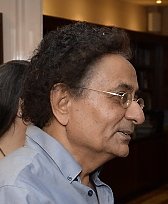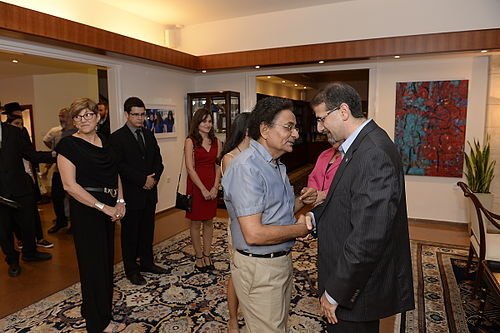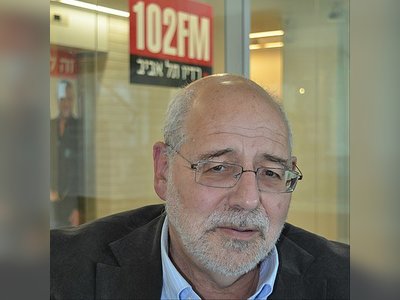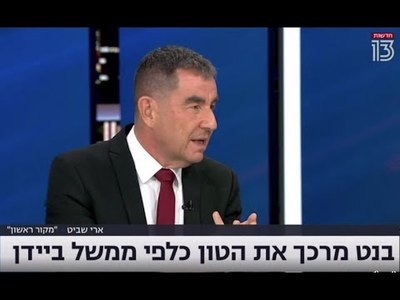מורשת גדולי האומה
בזכותם קיים
beta
Ben-Dror Yemini: Israeli Journalist and Commentator
Ben-Dror Yemini, born on April 17, 1954, is an Israeli journalist, columnist, editor, and legal expert. He began his career at the "Maariv" newspaper and, in 2014, transitioned to writing for the "Yediot Ahronot" newspaper.
During the 1980s, Yemini was an active advocate for Mizrahi Jews of Middle Eastern descent. However, with the outbreak of the Second Intifada, he shifted his focus to writing against what he perceived as incitement against Israel by Palestinians, radical left-wing activists, and others. He coined terms like "the industry of lies," referring to the activities of useful idiots, and "antisemitism in the guise of anti-Zionism" or "politically correct antisemitism." In 2021, Yemini was awarded the Tel Aviv Journalists' Association's Lifetime Achievement Award for his efforts in combatting BDS and the new wave of antisemitism.
Born in 1954 in Givat Amal Aleph, Tel Aviv, to parents of Yemeni descent, Yemini attended Moriah Elementary School and Chelouche High School. He later pursued studies in history at Tel Aviv University and law at the Herzliya Interdisciplinary Center. He completed his legal internship at the Vinrot Law Office. Following that, he practiced law for several years and served as an advisor to the Ministry of Immigrant Absorption, also acting as its spokesperson. Subsequently, he ventured into journalism and later served as the director of the public relations program at Tel Aviv University. In 1986, he published his book, "Political Punch." In 1989, he became the first editor of the combative social magazine "HaPatish."
Yemini also hosted radio programs and was involved with the Tzomet party. Later, he, along with Binyamin Ben-Eliezer, transitioned to activities within the Labor Party.
In the early 1990s, Yemini, along with Ehud Manor, participated in an Arabic language study program called "Ta'alem Veta'alem" under the guidance of Kamal Rian. From the beginning of 2003, he served as the opinions editor for the "Maariv" newspaper and wrote a weekly political column for the newspaper's "Shabbat Supplement." Since 2009, he has maintained a blog on the "Maariv" website, nrg, which includes his opinion pieces and his weekly column from the printed edition, often supplemented with external links, references, and translations of his articles. In recent years, Yemini has also contributed articles in English to the online newspaper "Times of Israel."
He is a member of the committee that selects Knesset candidates for the Knesset (Israel's parliament) and is part of the Forum for National Responsibility, a group of both right-wing and left-wing individuals seeking dialogue between different political camps and various public sectors in Israel, aiming to achieve a Zionist consensus that ensures Israel's existence as a Jewish and democratic state.
Before the 19th Knesset elections, Yemini received an offer to run for the Knesset as part of Tzipi Livni's party, "The Movement." He considered the offer for a few days but ultimately declined, as he preferred to influence through journalistic writing. In the Jewish year 5773 (2012-2013), he spent a year in the United States.
In late April 2014, following the demise of "Maariv," Yemini began writing for the "Yediot Ahronot" newspaper. In addition to his columns in the newspaper, he also publishes articles in English on the ynetnews website, intended for readers worldwide. Most of his articles delve into the Israeli-Palestinian conflict and the new wave of antisemitism.
Yemini has identified himself as a left-wing Zionist on several occasions. In the late 1980s, he participated in meetings between Mizrahi intellectuals and Palestinian intellectuals (despite laws prohibiting meetings between Israelis and PLO representatives). Yemini supports a Palestinian state alongside Israel and the division of Jerusalem as a means to resolve the Israeli-Palestinian conflict. He opposes Jewish settlement in Arab neighborhoods of Jerusalem and advocates for a separation between Israel and the Palestinians, including unilateral steps, though he has criticized certain aspects of the disengagement plan. In the past, he expressed limited support for the Geneva Initiative and full support for Ami Ayalon's National Initiative for peace. He vehemently opposes the right of return, asserting that it is essentially a call for Israel's destruction. Yemini supports a peace agreement with the Palestinians based on the Geneva Initiative.
He supports Israel's military operations as a means of self-defense while emphasizing Israel's efforts to minimize harm to innocent Palestinian civilians. This stands in contrast to Palestinian terrorism, which targets innocent Israeli civilians. Nonetheless, Yemini believes in the importance of constructive criticism of IDF actions when there are deviations from ethical standards or international law. He calls for authorities to investigate such cases and punish the guilty when necessary.
In response to the Palestinian demand for a full right of return for refugees to Israeli territory, Yemini has published a series of articles discussing various aspects of the Israeli-Arab conflict. In these articles, he addresses the discrepancy between the alleged "Nakba" and other refugee situations, the attempt to frame the right of return, the financial support given to Palestinians since the Oslo Accords, a comparative analysis between Israeli Arabs and other Muslim communities in the West, and the historical suffering and persecution of Jews in Muslim countries, particularly in the 20th century. He argues that the Palestinian refugee issue is a fabrication and an "industry of danger" used to delegitimize Israel.
During Operation Cast Lead at the end of 2008 and the beginning of 2009, Yemini published a series of three articles addressing accusations from critics of the war and offering a critical analysis of Israel's actions. In the first article, he argues that Hamas is an organization that seeks the destruction of Israel, global domination, and even the extermination of Jews. In the second article, he presents a comparative perspective, concluding that Israel's response was proportionate when compared to NATO's bombing in Kosovo or NATO's war against the Taliban in Afghanistan. In the third article, Yemini counters the claims of pundits, such as Naomi Klein, Robert Fisk, and Gideon Levy, who accused Israel of lacking morality during Operation Cast Lead. These three articles were translated into various languages and published in newspapers worldwide.
In September 2009, Yemini wrote a scathing article against the Goldstone Report, titled "Goldstone is the Criminal." He accused Richard Goldstone of committing a moral crime by exploiting human rights for a fierce anti-Israel agenda. Yemini claimed that Goldstone's report amounted to spreading lies and distorting facts while disregarding Hamas's antisemitic agenda and terrorist activities, both against Israelis and Palestinians. He stated, "Goldstone committed a moral crime. Not against the State of Israel, but against human rights. He turned them into a weapon in the hands of dark regimes. Goldstone did not stumble; he did it deliberately... As the details of this report are exposed, it becomes clear that it is a hoax." Alongside his harsh critique of the Goldstone Report, Yemini advocated for an investigation into allegations of misconduct and human rights violations committed by the IDF.
In response to the Gaza flotilla incident on May 31, 2010, Yemini called for a thorough investigation of the events, urging Israeli authorities to hold those who deviated from ethical standards accountable. He emphasized the importance of Israel maintaining the moral high ground in conflicts like these.
In his articles, Yemini has accused European countries and the international community of unfairly criticizing Israel while ignoring the real threats posed by Iran, Hamas, and other extremist groups. He has also criticized some Israelis and Jewish organizations for what he perceives as their excessive self-criticism and advocacy for concessions in the Israeli-Palestinian conflict.
Yemini has written extensively about the BDS (Boycott, Divestment, and Sanctions) movement, which seeks to put economic and political pressure on Israel to change its policies towards the Palestinians. He views BDS as a misguided and harmful movement that ultimately undermines the prospects for peace and coexistence between Israelis and Palestinians. He has criticized international organizations and academics who support BDS, arguing that they are often motivated by bias and misinformation.
Yemini has been a vocal critic of antisemitism in various forms, including its manifestation in anti-Israel rhetoric and actions. He has argued that much of what is labeled as criticism of Israel is, in reality, a form of antisemitism that seeks to delegitimize the Jewish state and deny its right to exist. He has written about the rise of antisemitism in Europe and other parts of the world and has called on governments and civil society to confront and combat this hatred.
In his articles and public appearances, Yemini has explored questions of Jewish identity and the challenges faced by Jews in the modern world. He has discussed the history of Jewish persecution and the importance of remembering the Holocaust as a lesson for future generations. He has also addressed issues of assimilation and intermarriage among Jews and has advocated for a strong sense of Jewish identity and pride.
Yemini has been a strong advocate for Israel's right to exist as a Jewish and democratic state. He has defended Israel's security measures and military actions as necessary for its survival in a hostile region. At the same time, he has called for a two-state solution to the Israeli-Palestinian conflict and has criticized Israeli policies that he views as obstacles to peace.
Throughout his career, Ben-Dror Yemini has used his platform as a journalist and commentator to engage in debates about Israel, antisemitism, and Jewish identity. His writings have generated both support and controversy, but he remains a prominent voice in discussions related to these important issues.
Born in 1954 in Givat Amal Aleph, Tel Aviv, to parents of Yemeni descent, Yemini attended Moriah Elementary School and Chelouche High School. He later pursued studies in history at Tel Aviv University and law at the Herzliya Interdisciplinary Center. He completed his legal internship at the Vinrot Law Office. Following that, he practiced law for several years and served as an advisor to the Ministry of Immigrant Absorption, also acting as its spokesperson. Subsequently, he ventured into journalism and later served as the director of the public relations program at Tel Aviv University. In 1986, he published his book, "Political Punch." In 1989, he became the first editor of the combative social magazine "HaPatish."
Yemini also hosted radio programs and was involved with the Tzomet party. Later, he, along with Binyamin Ben-Eliezer, transitioned to activities within the Labor Party.
In the early 1990s, Yemini, along with Ehud Manor, participated in an Arabic language study program called "Ta'alem Veta'alem" under the guidance of Kamal Rian. From the beginning of 2003, he served as the opinions editor for the "Maariv" newspaper and wrote a weekly political column for the newspaper's "Shabbat Supplement." Since 2009, he has maintained a blog on the "Maariv" website, nrg, which includes his opinion pieces and his weekly column from the printed edition, often supplemented with external links, references, and translations of his articles. In recent years, Yemini has also contributed articles in English to the online newspaper "Times of Israel."
He is a member of the committee that selects Knesset candidates for the Knesset (Israel's parliament) and is part of the Forum for National Responsibility, a group of both right-wing and left-wing individuals seeking dialogue between different political camps and various public sectors in Israel, aiming to achieve a Zionist consensus that ensures Israel's existence as a Jewish and democratic state.
Before the 19th Knesset elections, Yemini received an offer to run for the Knesset as part of Tzipi Livni's party, "The Movement." He considered the offer for a few days but ultimately declined, as he preferred to influence through journalistic writing. In the Jewish year 5773 (2012-2013), he spent a year in the United States.
In late April 2014, following the demise of "Maariv," Yemini began writing for the "Yediot Ahronot" newspaper. In addition to his columns in the newspaper, he also publishes articles in English on the ynetnews website, intended for readers worldwide. Most of his articles delve into the Israeli-Palestinian conflict and the new wave of antisemitism.
The Israeli-Palestinian Conflict
Yemini has identified himself as a left-wing Zionist on several occasions. In the late 1980s, he participated in meetings between Mizrahi intellectuals and Palestinian intellectuals (despite laws prohibiting meetings between Israelis and PLO representatives). Yemini supports a Palestinian state alongside Israel and the division of Jerusalem as a means to resolve the Israeli-Palestinian conflict. He opposes Jewish settlement in Arab neighborhoods of Jerusalem and advocates for a separation between Israel and the Palestinians, including unilateral steps, though he has criticized certain aspects of the disengagement plan. In the past, he expressed limited support for the Geneva Initiative and full support for Ami Ayalon's National Initiative for peace. He vehemently opposes the right of return, asserting that it is essentially a call for Israel's destruction. Yemini supports a peace agreement with the Palestinians based on the Geneva Initiative.
He supports Israel's military operations as a means of self-defense while emphasizing Israel's efforts to minimize harm to innocent Palestinian civilians. This stands in contrast to Palestinian terrorism, which targets innocent Israeli civilians. Nonetheless, Yemini believes in the importance of constructive criticism of IDF actions when there are deviations from ethical standards or international law. He calls for authorities to investigate such cases and punish the guilty when necessary.
In response to the Palestinian demand for a full right of return for refugees to Israeli territory, Yemini has published a series of articles discussing various aspects of the Israeli-Arab conflict. In these articles, he addresses the discrepancy between the alleged "Nakba" and other refugee situations, the attempt to frame the right of return, the financial support given to Palestinians since the Oslo Accords, a comparative analysis between Israeli Arabs and other Muslim communities in the West, and the historical suffering and persecution of Jews in Muslim countries, particularly in the 20th century. He argues that the Palestinian refugee issue is a fabrication and an "industry of danger" used to delegitimize Israel.
During Operation Cast Lead at the end of 2008 and the beginning of 2009, Yemini published a series of three articles addressing accusations from critics of the war and offering a critical analysis of Israel's actions. In the first article, he argues that Hamas is an organization that seeks the destruction of Israel, global domination, and even the extermination of Jews. In the second article, he presents a comparative perspective, concluding that Israel's response was proportionate when compared to NATO's bombing in Kosovo or NATO's war against the Taliban in Afghanistan. In the third article, Yemini counters the claims of pundits, such as Naomi Klein, Robert Fisk, and Gideon Levy, who accused Israel of lacking morality during Operation Cast Lead. These three articles were translated into various languages and published in newspapers worldwide.
In September 2009, Yemini wrote a scathing article against the Goldstone Report, titled "Goldstone is the Criminal." He accused Richard Goldstone of committing a moral crime by exploiting human rights for a fierce anti-Israel agenda. Yemini claimed that Goldstone's report amounted to spreading lies and distorting facts while disregarding Hamas's antisemitic agenda and terrorist activities, both against Israelis and Palestinians. He stated, "Goldstone committed a moral crime. Not against the State of Israel, but against human rights. He turned them into a weapon in the hands of dark regimes. Goldstone did not stumble; he did it deliberately... As the details of this report are exposed, it becomes clear that it is a hoax." Alongside his harsh critique of the Goldstone Report, Yemini advocated for an investigation into allegations of misconduct and human rights violations committed by the IDF.
In response to the Gaza flotilla incident on May 31, 2010, Yemini called for a thorough investigation of the events, urging Israeli authorities to hold those who deviated from ethical standards accountable. He emphasized the importance of Israel maintaining the moral high ground in conflicts like these.
In his articles, Yemini has accused European countries and the international community of unfairly criticizing Israel while ignoring the real threats posed by Iran, Hamas, and other extremist groups. He has also criticized some Israelis and Jewish organizations for what he perceives as their excessive self-criticism and advocacy for concessions in the Israeli-Palestinian conflict.
Yemini has written extensively about the BDS (Boycott, Divestment, and Sanctions) movement, which seeks to put economic and political pressure on Israel to change its policies towards the Palestinians. He views BDS as a misguided and harmful movement that ultimately undermines the prospects for peace and coexistence between Israelis and Palestinians. He has criticized international organizations and academics who support BDS, arguing that they are often motivated by bias and misinformation.
Antisemitism and Jewish Identity
Yemini has been a vocal critic of antisemitism in various forms, including its manifestation in anti-Israel rhetoric and actions. He has argued that much of what is labeled as criticism of Israel is, in reality, a form of antisemitism that seeks to delegitimize the Jewish state and deny its right to exist. He has written about the rise of antisemitism in Europe and other parts of the world and has called on governments and civil society to confront and combat this hatred.
In his articles and public appearances, Yemini has explored questions of Jewish identity and the challenges faced by Jews in the modern world. He has discussed the history of Jewish persecution and the importance of remembering the Holocaust as a lesson for future generations. He has also addressed issues of assimilation and intermarriage among Jews and has advocated for a strong sense of Jewish identity and pride.
Yemini has been a strong advocate for Israel's right to exist as a Jewish and democratic state. He has defended Israel's security measures and military actions as necessary for its survival in a hostile region. At the same time, he has called for a two-state solution to the Israeli-Palestinian conflict and has criticized Israeli policies that he views as obstacles to peace.
Throughout his career, Ben-Dror Yemini has used his platform as a journalist and commentator to engage in debates about Israel, antisemitism, and Jewish identity. His writings have generated both support and controversy, but he remains a prominent voice in discussions related to these important issues.
- בן-דרור ימיניhe.wikipedia.org






